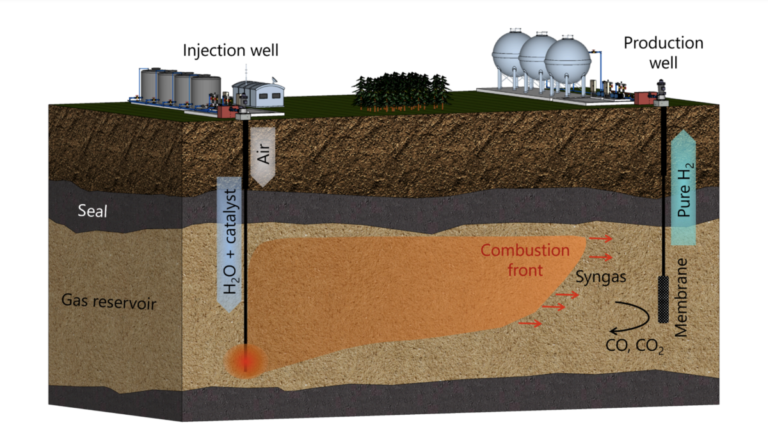While a team of Russian researchers proposed a new approach to produce hydrogen directly in gas wells, Plug Power and CPH2 ensured the certification of the hydrogen systems.
A team of researchers from Skolkovo Institute of Science and Technology (Skoltech) has shown that generating a substantial amount of hydrogen from gas reserves is feasible, thanks to the thermocatalytic conversion of methane. The approach enables hydrogen synthesis via a catalyst to lower the required temperature. The researchers then proposed injecting air or oxygen into the well, followed by ignition. “The rising temperature at the combustion front in the reservoir initiates the reaction between natural gas and steam, supported by the pre-injected catalyst, creating syngas with high hydrogen content in the porous media,” the Russian researchers wrote. The hydrogen is then recovered from a production well through a membrane that allows the filtration of hydrogen while inhibiting other gases, including CO2that remain locked in the rock. “All four phases of the proposed process are based on established and widely used technologies,” the researchers explained in the article published in Fuel.
Plug-in power supply has achieved industrial certification for its powerful 1 MW stationary system. “Supported by this industry-leading third-party certification, customers ranging from hyperscale data centers and EV (electric vehicle) charging stations in areas with limited power grids to microgrid applications that power local networks during Public Safety Power Shutoff (PSPS) events, now quickly – follow the implementation of Plug’s powerful stationary system,” said the New York State-based company.
CPH2 has received a CE mark for its electrolyzer stacks, having received a declaration of conformity following an independent assessment by a notified body. “The CE marking illustrates that the company is producing the stacks within EU directives and harmonized standards and is an important milestone towards commercial readiness.” said the UK-based green hydrogen technology and manufacturing company that developed the IP-protected membrane-free electrolyser.
Nine gas transmission system operators from the Baltic Sea region to have signed a Memorandum of Understanding (MoU) that aims to coordinate and facilitate the hydrogen infrastructure and promote the development of the hydrogen market. The parties to the MoU are the Polish Gaz-System, the Estonian Elering, the Danish Energinet, the Finnish Gasgrid Vetyverkot, the Lithuanian Amber Grid, the Swedish Nordion Energi, the German Gascade Gastransport, the Latvian Conexus Baltic Grid and the German Ontras Gastransport .
Always fuel has submitted a project proposal for the phased development of up to 2 GW vegetable hydrogen production capacity at the Turning back Energy park under development by the municipality of Vejen, Denmark. “The project named Frigg, if incorporated by the municipality, will become Everfuel’s first large-scale production facility dedicated to the supply of hydrogen via pipelines to industrial customers in Germany,” said the Danish company, adding that it had already secured land for the expansion.
This content is copyrighted and may not be reused. If you would like to collaborate with us and reuse some of our content, please contact: editors@pv-magazine.com.


